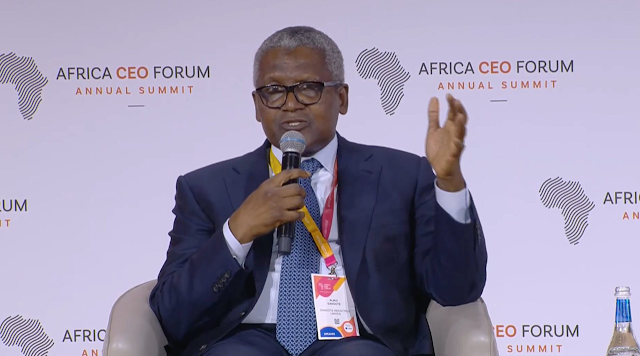Monday, July 14, 2025 - Dangote, has urged African entrepreneurs, business leaders and wealthy individuals to invest in the development of the continent.
Speaking while hosting participants of the Global CEO Africa
Programme from Lagos Business School and Strathmore Business School, Nairobi,
after a tour of the Dangote Petroleum Refinery & Petrochemicals in
Ibeju-Lekki, Lagos, Dangote emphasised that with the right investments, Africa
has the potential to grow and compete globally.
He asserted that what the continent needs are bold and
transformative projects capable of addressing its long-standing challenges.
Citing the successful construction of the world’s largest single-train
refinery—the Dangote Petroleum Refinery—as proof that nothing is impossible, he
maintained that similar achievements can be replicated across sectors to drive
economic growth.
Dangote reflected on the initial scepticism surrounding the
refinery project, noting that despite numerous obstacles, the group remained
steadfast in its commitment to delivering on its vision.
“There will always be challenges. In fact, life without
challenges isn’t exciting. You just hope for the kind of challenges you can
overcome—not the ones that overwhelm you,” he remarked.
He explained that completing the refinery has emboldened the
group to pursue even more ambitious goals: “Now that we’ve built this refinery,
we believe we can do anything. We aim to make our fertiliser company the
largest in the world—and we’ve set ourselves a 40-month timeline.”
Dangote highlighted Africa’s wealth in both human and
natural resources, stressing that business leaders are in a privileged position
to harness these assets and create jobs for the continent’s growing population.
He stated that development cannot be left to governments alone, urging the
private sector to trust in national leadership and invest at home instead of
moving capital abroad.
“We, as Africans, must stop taking our money abroad. We
should invest it here to build our countries and the continent. As for me, I
don’t take my money out of Africa. If we don’t show confidence in our own
economies and leadership, foreign investors certainly won’t. After all, we know
our leaders better than anyone else. That money being taken out of the
continent should be left here, where it can benefit everyone,” he advised.
While many African nations have achieved political
independence, Dangote argued that they remain economically dependent. He cited
countries like Dubai and Singapore, which were on par with some African
countries in the 1970s but have surged ahead through deliberate policies and
partnerships with visionary entrepreneurs.
Dangote expressed concern about the disparity between
Africa’s rapidly growing population and the limited job opportunities
available. He called for a strong banking sector, a robust manufacturing base,
and a thriving agricultural sector as cornerstones of the continent’s
transformation.
He also stressed the importance of improved
interconnectivity among African nations, revealing that it is currently cheaper
to import goods from Spain than to transport cement clinker from Nigeria to
neighbouring Ghana.
Acknowledging policy inconsistency and infrastructural
challenges, Dangote encouraged the visiting CEOs not to be deterred but to
remain ambitious while acquiring deep knowledge of their respective industries.
“If you think small, you don’t grow. If you think big, you
grow. It’s better to try and fail than never to try at all,” he advised the 24
CEOs in attendance from six African countries.
Academic Director of the Global CEO Africa Programme at
Lagos Business School, Patrick Akinwuntan, explained that the initiative is
designed to inspire Africa’s future business leaders.
The programme, in partnership with Strathmore Business
School in Nairobi, comprises three modules, requiring participants to spend a
week each in Nairobi (Kenya), Lagos (Nigeria), and New Haven (USA).
“The goal is to nurture business leaders who see Africa as a
single market—one without borders—focused on the continent’s vast potential.
The refinery is a powerful symbol that vision goes beyond mere sight,” he said.
Akinwuntan, who is also the former Managing Director of
Ecobank Nigeria, praised Dangote for his integrity, competence, and boldness in
bringing such a monumental project to fruition.
Executive Dean of Strathmore Business School, Dr Caesar
Mwangi, echoed these sentiments. He said the visit would inspire CEOs to
realise that only Africans can truly develop the continent.
“This refinery is the world’s largest single-train refinery.
It’s proof that we must dream big, think big, and—most importantly—act. If the
Dangote Group can achieve this, then so can others across the continent,”
Mwangi said.
“Every CEO here can take this inspiration back home and
initiate impactful projects that will uplift our continent and create
opportunities for the millions of young Africans who need them,” he added.
Dean of Lagos Business School, Prof Olayinka David-West,
stated that the visit aligned with the school’s mission of grooming leaders
capable of addressing Africa’s complex social and institutional challenges.
She lauded Dangote as a visionary leader who mobilises
resources to confront the continent’s critical problems. She noted that the
refinery’s ripple effect extends beyond petroleum production, enhancing
livelihoods and national wellbeing.
“This facility is pivotal. It serves as a practical tool to
implement frameworks like the African Continental Free Trade Area (AfCFTA).
While it’s one project, its effects will be felt across multiple sectors,” she
explained.
Dr Rabiu Olowo, CEO of Nigeria’s Financial Reporting Council
and a participant in the programme, said the visit had reignited the need for
bold and courageous thinking in pursuing sustainable national development.
The visiting CEOs also included global banking leader Segun
Aina; Managing Director of Family Bank, Nairobi, Nancy Njau; Executive Director
and Chief Financial Officer for Cameroon, CEMAC, and CESA Region at Ecobank,
Emmanuel Wakili; and former President of the CFA Society Nigeria, Ibukun
Oyedeji, among others.








0 Comments